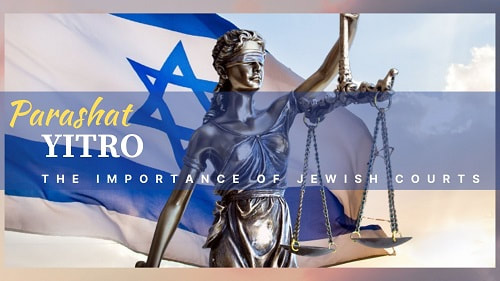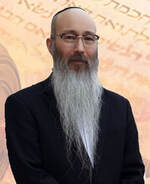|
By: HaRav Menashe Sasson מאת: הרב מנשה ששון This week's Parashat piece is dedicated to all the Jews in Eretz Yisra'el who have been murdered, abducted, or otherwise harmed in the current war against our Arab enemies. The Torah, in Parashat Yitro, teaches that the Jewish people should establish courts of law. [T]hou shalt provide out of all the people able men, such as fear God, men of truth, hating unjust gain; and place such over them, to be rulers of thousands, and rulers of hundreds, rulers of fifties, and rulers of tens; and let them judge the people at all seasons: and it shall be that every great matter they shall bring to thee, but every small matter they shall judge: so that it be easier for thyself, and they shall bear the burden with thee. If thou shalt do this thing, and God commanded thee so, then thou shalt be able to endure, and all this people shall go to their place in peace. Shemot 18:21-23. Non-Jews, that is, the descendants of Noah — the rest of humanity — were likewise commanded to establish court systems. Maseket Sanhedrin 56a. As of January 1, 2024, approximately 7,208,000 Jews lived in Medinat Yisar’el (the modern state of Israel), which accounted for approximately 73.2% of the country’s total population of 9,842,000. The non-Jewish Arab population of Medinat Yisra’el totaled approximately 2,080,000 (21.1% of the total population). Of the estimated 15.2 million Jews worldwide, 47% live in Medinat Yisra’el. Jewish Virtual Library. At first glance, it may appear that the misva of establishing a Jewish court system is not, as a practical matter, a misva that can be performed by most of the worldwide population of Jews. The Jewish law concept of dina demalkhuta dina (the law of the land is the law) might even be seen as exempting Jews who live in foreign lands (e.g., outside of Medinat Yisra’el) from the misva of establishing a Jewish court system. Notwithstanding that the Jewish people have not had political independence for most of its more than 3,500+ year history, Jewish law, in unprecedented fashion, has not only endured, but has continued to evolve and develop because, for much of that period, Jews managed to retain judicial autonomy, even in exile, under what are generally referred to as “Charters of Privilege.” A “Charter of Privilege” was an arrangement whereby the ruling government allowed a minority group which resided within its borders to govern itself, to include operating its own independent legal system. To pay for this privilege, the minority group collected taxes from its members, which it then paid over to the ruling government. Inside Eretz Yisra’el (the Land of Israel), Jewish political independence, including judicial autonomy, existed from shortly after the crossing of the Jordan river through the destruction of the Second Temple. Following the destruction of the Second Temple, Jewish judicial autonomy continued for a time, under the functional equivalent of a charter of privilege. Meanwhile, Jewish judicial autonomy existed even in exile, under charters of privilege, in places, for example, like Babylonia, Spain, and Poland. The jurisdiction of Jewish courts encompassed both private civil matters (contracts, torts, family law, etc.) and public law (government administration, taxes, etc.), and in some locales, included criminal law matters. It was under these circumstances that the body of Jewish law developed over the centuries. It was also under these circumstances that the Rabbis instituted the prohibition against Jews litigating against fellow Jews in non-Jewish courts (Arka’ot Shel Goyim). The Jewish Emancipation, beginning in the late 18th century, resulted in the loss, in most places (with notable exceptions including Turkey and North Africa), of Jewish judicial autonomy and, with it, the ability of Jews to fully perform the misva, found in Parashat Yitro, of establishing and operating a Jewish court system. In 1948, with the founding of Medinat Yisra’el, the Jewish people regained not just judicial autonomy, but for the first time in almost 2,000 years, national sovereignty over at least a portion of their homeland. Unfortunately, however, as good as things are now, compared with the past 2,000 years, all is not as it should be. Medinat Yisra’el was founded by secular, socialist Jews. Consequently, the establishment of Medinat Yisra’el resulted in the only Jewish state in the world adopting a patchwork of laws from a multitude of foreign legal systems, which, in turn, resulted in a secular court system that is run by Jews, albeit not a Jewish court system of the type which is contemplated by Parashat Yitro. The good news, however, is that, if you and your family have not already made Aliyah, or at least have not acquired Israeli citizenship, you can, by acquiring Israeli citizenship, either through Aliyah or otherwise, participate in the national civic life of the country by working with your Jewish brothers and sisters who are attempting to fulfill the misva of establishing a Jewish judicial system which is based on Jewish law and which has as members of its judiciary persons who decide cases in a manner which is consistent with judges who “fear God.” שבת שלום Shabbat Shalom! Copyright © The Israel Foundation. All Rights Reserved.
0 Comments
Your comment will be posted after it is approved.
Leave a Reply. |
THE ISRAEL FOUNDATION


